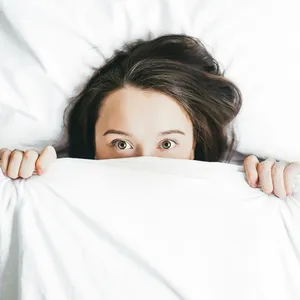Sleep medications: How effective are they really?
Theresa Hauser, MSc. | 20.02.2025

Many people regularly have trouble sleeping and resort to sleeping pills. But are these pills really a long-term solution, or are there more effective methods to promote restful sleep? In this article, we examine how sleeping pills work, their risks, and the alternatives for restful sleep.
Sleeping medications: short-term relief with long-term dangers
Sleeping pills like benzodiazepines (e.g., diazepam or lorazepam), Z-drugs (e.g., zolpidem or zopiclone), and antihistamines (like diphenhydramine) work by activating certain receptors in the brain that have a calming effect, thus making it easier to fall asleep. They are particularly effective in stressful phases or crises in the short term.
However, it should be noted that the regular and long-term use of these drugs is associated with significant risks. The risk of addiction is particularly high with benzodiazepines and Z-drugs. Many people quickly develop a physical and psychological dependence, which makes it difficult to stop taking them later and is often accompanied by unpleasant withdrawal symptoms. The most common side effects include pronounced daytime drowsiness, concentration difficulties, memory problems, and an increased risk of accidents due to slowed reactions.
Sleeping medications can also become a financial burden, especially if they need to be regularly obtained by prescription.
Why sleeping pills are not a long-term solution for your sleep problem
A major disadvantage of sleeping pills is that they only treat the symptoms. They do not address the real causes of sleep problems, such as chronic stress, unhealthy sleep habits, psychological stress, or physical illnesses. If the causes are not identified and addressed, sleep problems often reappear or even worsen after stopping the medication.
Only by addressing and targeting the underlying causes of your sleep problems will you achieve long-term improvements.
Improving sleep without medication: effective alternatives
Experts particularly recommend cognitive behavioral therapy for insomnia (CBT-I) for the treatment of sleep disorders. Many studies have demonstrated that CBT-I is significantly more effective than sleeping pills in the long run. With CBT-I, you learn to recognize and change negative thoughts about sleep and to establish healthy sleep habits.
How sleep² can help you improve your sleep in a natural and sustainable way
Our program is based on the principles of cognitive behavioral therapy and offers you structured support, with just a few minutes of training per day being sufficient. The sleep² intensive program offers you ways and tools to manage the actual causes of your sleep problems in the long term.
The intensive program includes:
- Personal sleep analysis: We help you closely examine your sleep habits and the causes of your problems.
- Coaching: You receive concrete, practice-proven methods to sustainably improve your sleep quality step by step.
- Sleep tracking and success measurement: You can immediately see how your sleep improves and actively track your progress.





